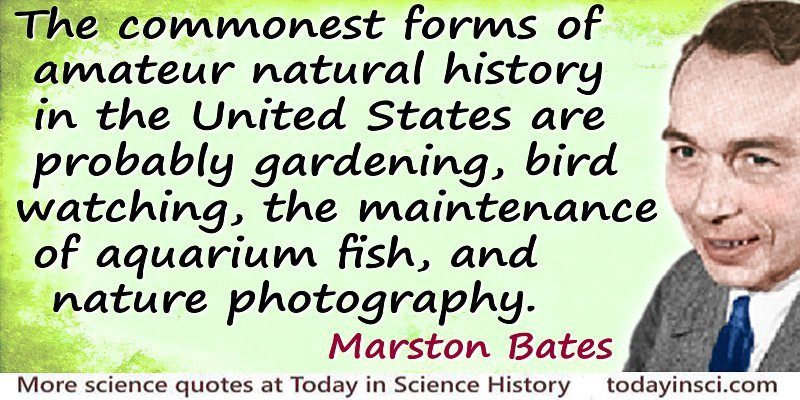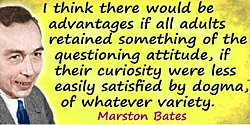 (source)
(source)
|
Marston Bates
(23 Jul 1906 - 3 Apr 1974)
American zoologist and writer who studied mosquitoes and tropical diseases. He was also an environmental activist.
|
Marston Bates
“The commonest forms of amateur natural history”
Illustrated Quote - Large (800 x 400 px)
More Marston Bates quotes on science >>
After this quote introducing gardening, bird watching, aquarium maintenance and nature photography as activities of nature-lovers, Marston Bates wrote in his book, The Nature of Natural History commenting on how bird watchers are the best organized of these groups. They were able to contribute to scientific knowledge with data from annual censuses. He also identified how photography was an invaluable illustrative aid in all fields of science.
Bates pointed out how the other groups had great potential for scientific investigation, because, he explained:
“Of all of these, the people with gardens and the people with aquaria are overlooking the most golden opportunities, because they have perfect setups for using the experimental method. The gardener can investigate plant nutrition, environmental effects, competition, strain behavior, fertilization mechanisms—he has a whole biology laboratory with his seeds and his soil. The man with an aquarium (or better, with several aquaria) has an even better biological laboratory, because the whole environment is under his control.”
- Science Quotes by Marston Bates.
- 23 Jul - short biography, births, deaths and events on date of Bates's birth.
- Marston Bates - context of quote “Research is the process of going up alleys” - Medium image (500 x 250 px)
- Marston Bates - context of quote “Research is the process of going up alleys” - Large image (800 x 400 px)
- Marston Bates - context of quote “The commonest forms of amateur natural history” - Medium image (500 x 250 px)
- Marston Bates - context of quote “if…curiosity were less easily satisfied by dogma” - Medium image (500 x 250 px)
- Marston Bates - context of quote “if…curiosity were less easily satisfied by dogma” - Large image (800 x 400 px)
- The Nature of Natural History, by Marston Bates. - book suggestion.
- Booklist for author Marston Bates.








